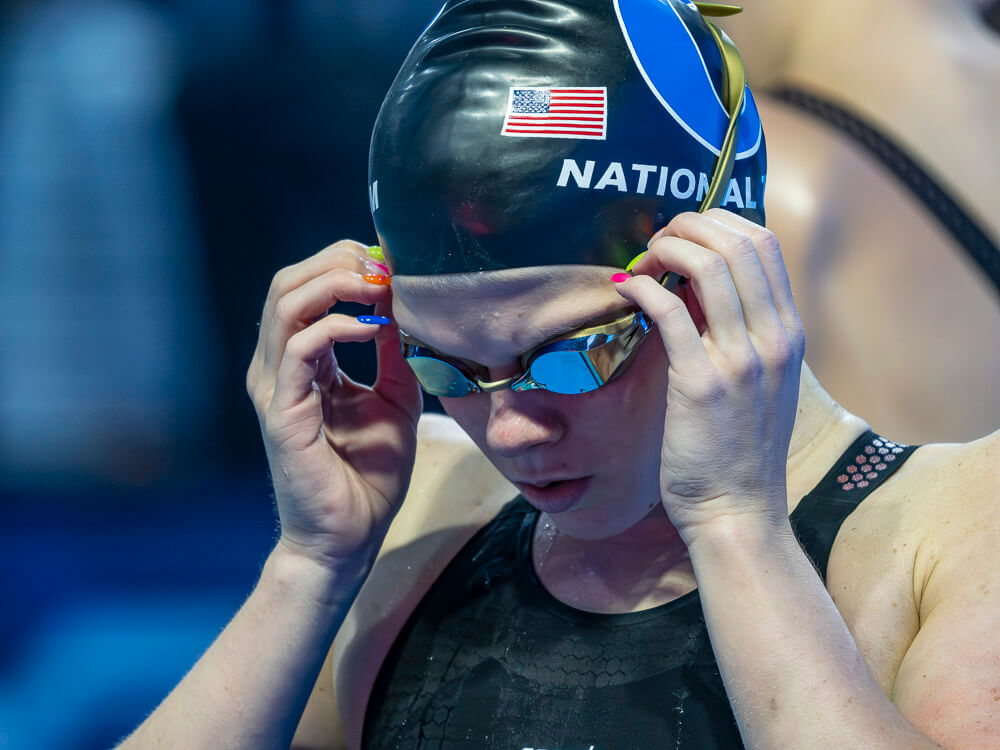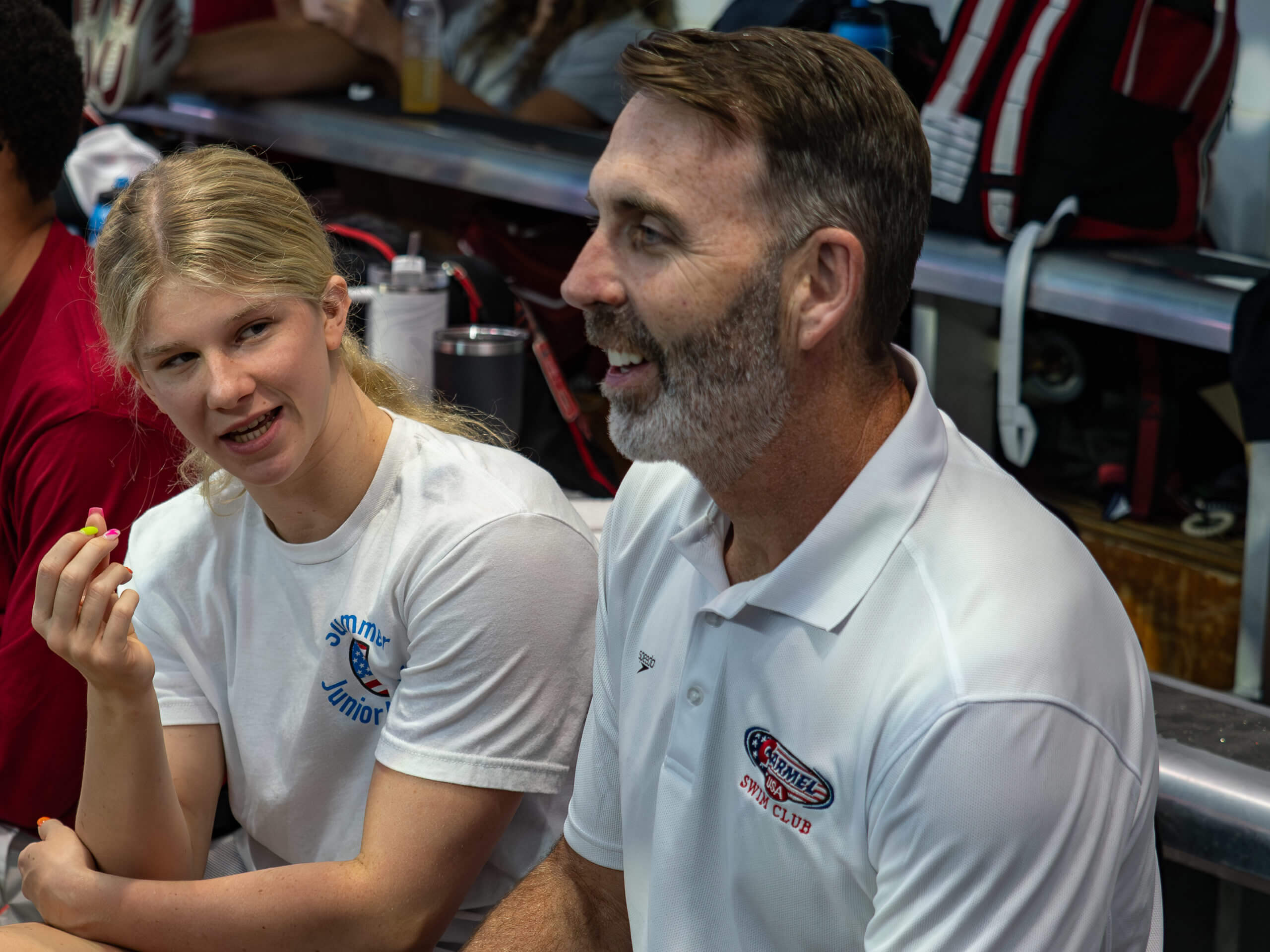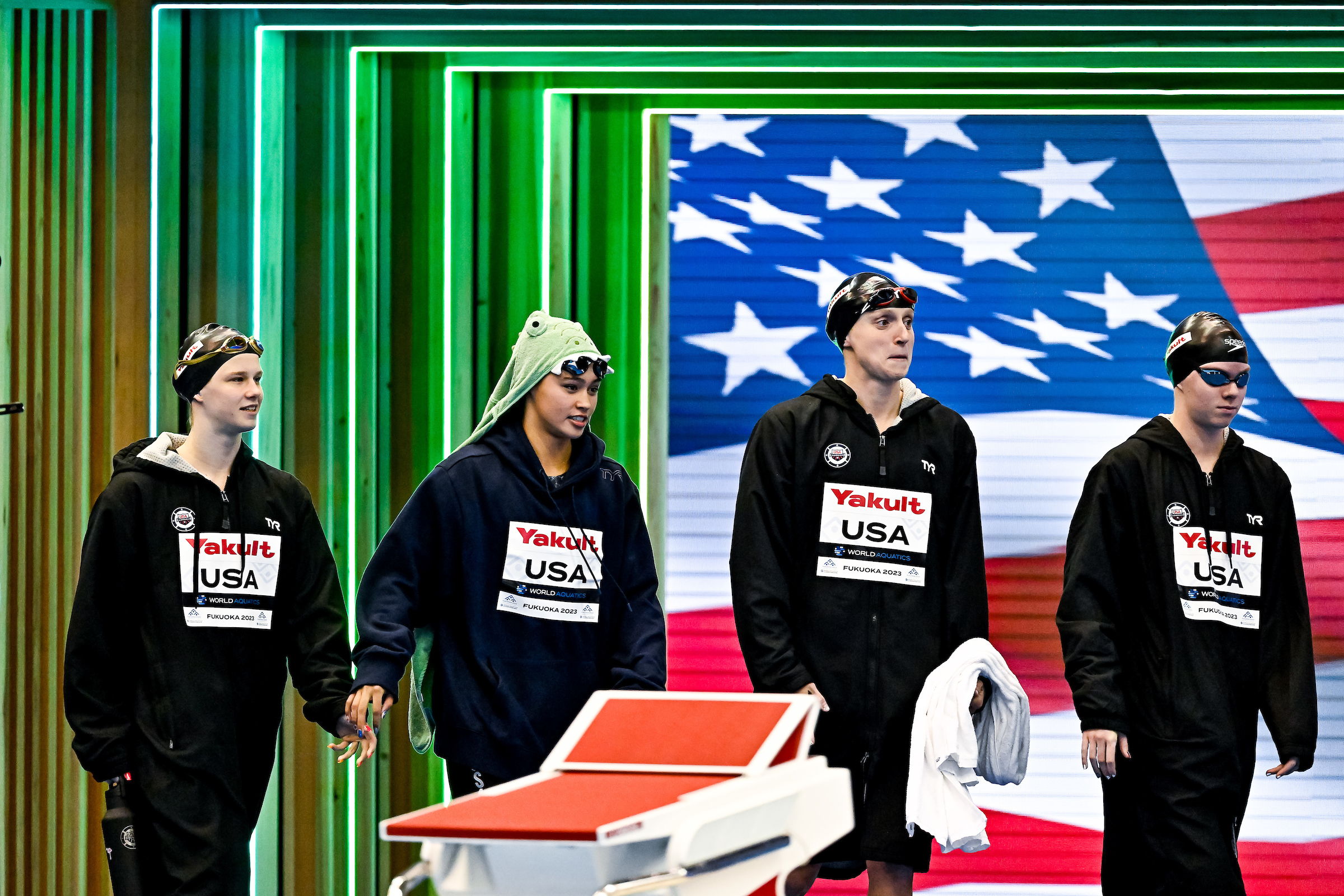Alex Shackell Breaks Through to Major Level; Coach Credits ‘Consistent Dedication to Excellence’

Alex Shackell Breaks Through to Major Level; Coach Credits ‘Consistent Dedication to Excellence’
Diving in for the anchor leg of her country’s 800 freestyle relay was Ariarne Titmus, as successful a 200 freestyler as any in the world over the past few years. Titmus was the Olympic gold medalist, and she had finished just three hundredths off a 14-year-old world record one day earlier in the individual final, albeit in a silver-medal performance behind record-breaking countrywoman Mollie O’Callaghan.
Titmus would match up for gold against American anchor Alex Shackell, who one month earlier owned a best time of 2:01.21 in the 200 free. Shackell’s American teammates would need to provide her an enormous lead to give the swimmer making her senior international debut any shot of holding off Titmus, but instead, the lead was nine hundredths.
The final result was relatively predictable, with Titmus clocking the quickest split ever at 1:52.41 while pulling away for gold and a new world record while Shackell swam a solid 1:56.38 to lock up American silver. But simply getting herself into that position is a credit to the 16-year-old’s Shackell commitment to making the most of her immense talent. Seen as a future force in the butterfly events since 2021, Shackell made the jump from promise to performance more quickly than expected, particularly with her first World Championships performance coming in the 200 free.

Alex Shackell (left) with coach Chris Plumb — Photo Courtesy: Peter H. Bick
Chris Plumb, the head coach at Carmel Swim Club and Carmel High School, has guided plenty of accomplished swimmers, including 2021 U.S. Olympians Drew Kibler and Jake Mitchell, has seen everything he hopes for in an athlete from Shackell.
“I attribute a lot to her consistent dedication to excellence,” Plumb said. “She comes in every day ready to work. She’s excited to be at practice. She wants to make changes. She’s upset when her stroke doesn’t feel right, and she’s willing to work on it. She sets really high standards for herself, and she doesn’t let things get in the way of what she thinks she can accomplish. She’s fearless in terms of her ability and willingness to go out after races.”
The four-lap freestyle event was hardly on Shackell’s radar for U.S. Nationals in June. She and Plumb had focused primarily on the 200 fly, an event which Shackell entered the meet as the No. 8 seed and seemingly poised for a drop. Indeed, Shackell got herself into the final and raced into second place for much of the swim, a spot on the Fukuoka team within reach, but she faded badly on the final length, her 35.01 split the slowest in the field of eight.
After going 2:07.95 in prelims, Shackell ended up fifth, and her coach took the blame for not appropriately preparing his swimmer to put the race together as planned. “One thing I know I missed with her is the long course butterfly in the fall,” Plumb said. “We decided to make her IM better. We saw that: she went 4:10 [in the 400-yard IM] and 1:54 [in the 200-yard IM]. I think I may have cost that long course butterfly this summer. We started too late.”
The 200 free, meanwhile, was not on Shackell’s radar at all, and she only competed in the race because of a lack of other events on the program that day. Naturally, Shackell dropped 3.5 seconds from her best time in prelims to unexpectedly qualify for the final. Swimming in lane one, Shackell was aggressive from the start, turning in the top three at each intermediate split, and she fought down the stretch to hold off Leah Smith, a veteran 11 years older than Shackell, one lane over.
Shackell ended up fifth in 1:56.70, a second faster than her already-improved time from prelims and good enough to book a spot in Fukuoka. It was a shock to everyone inside the Indiana University Natatorium — err, almost everyone.
“I would never put anything past her,” Plumb said. “It’s kind of an event I thought was going to go well for her, but I did not maybe see how far that could go. Watching her freestyle the day before in the 100 [where Shackell swam a best time of 54.22 in prelims], I was like, ‘OK, the 200 could be good.’ Once she made the final, it’s game on. I knew she had the confidence. Getting into the top-eight was the harder part because at that point, I knew that she would be good.”
And then came the chance to anchor the finals relay, an honor Shackell earned with a 1:56.05 split as part of the Americans’ prelims quarter. Conventional wisdom held that Erin Gemmell would be the lone swimmer from the morning squad that would hold over to the final, with Katie Ledecky, Bella Sims and Claire Weinstein set to enter, but Weinstein’s disappointing result in the individual event and Shackell’s speed on the prelim relay helped earn her the nod.
But how did she wind up on the anchor leg, a spot typically reserved for the fastest or most experienced member of the squad? Plumb, a member of the U.S. coaching staff at Worlds, argued against Shackell as the leadoff leg, citing her inexperience with the 200 free, and proposed slotting her in as the third swimmer. However, Australia’s status as a heavy gold-medal favorite brought about the unconventional lineup.
Shackell’s reaction to being named the anchor swimmer? “Oh, she was pumped,” Plumb said. “She was shocked, like, ‘Really? Really, guys, I’m going last?’ But she wasn’t afraid.
It was the chance of a lifetime for Shackell, an opportunity to win a medal but also soak up the realities of a high-pressure moment that she never would have received at, say, the World Junior Championships.

Alex Shackell (left) joined Bella Sims, Katie Ledecky & Erin Gemmell on the U.S. women’s 800 freestyle relay in Fukuoka — Photo Courtesy: Andrea Masini / Deepbluemedia / Insidefoto
“It was kind of surreal in the decision-making process when it happened,” Plumb said. “We kind of figured out that we wanted to stay with them as long as we could if we wanted any shot, as small as it was. I was like, ‘OK, she’s going last. She’s going to learn. She’s going to figure this out.’ I knew she was not going 1:52. Not yet.
“Having to go in the ready room and be next to Australia, all those things are going to help her so much more down the road than whatever that race because the race was decided at that point. We were going to get second pretty much. She was not going 1:52. She’s just not ready for that yet. To expect anything like that, she already dropped three seconds to get there in the first place. The learning, I think, is huge. All those things of having to go through that process.”
No doubt, Shackell will have a chance for more when she races next summer at the Olympic Trials, the downtown Indianapolis meet to be held close enough that Shackell will sleep in her own bed throughout. Her chances at qualifying for the Olympic team will be numerous: surely in the 200 free as a relay swimmer, and she will be a force in the 200 fly with just a few tweaks from her 2023 performance. She cannot be ruled out as a contender in the shorter events, either. A deep field of 56-second swimmers awaits in the 100 fly, but Shackell will not have to drop much to be among the contenders in the 100 free.
As Plumb considers the preparation for Shackell between now and Trials, he plans to incorporate additional long course training throughout the year, particularly in butterfly after he sensed a deficit this year, but for the most part, it’s about sticking with what has worked. He won’t try to make Shackell a swimmer that she isn’t. She’s a speed-first swimmer, always aggressive in her races, sometimes to a detriment, but that approach has brought about special results already.
“We want to continue to expand her speed,” Plumb said. “She’s not swimming down to the 200. She’s swimming up to the 200. We’ve got to continue to make sure we can do that distance well but not lose the reason why we got there. There’s part of old coaching that would say, ‘Hey, just do more aerobic, and do more distance.’ That’s one strategy, but I don’t think that’s going to work with her because if you bury her speed, she’s going to be done.”
“That’s not what makes her great. Finding that balance, like how do we finish that last 50 and feel great about it? Distance per stroke, working her underwaters, all that stuff. And just building a greater aerobic foundation here in the fall long course maybe than we did a year ago.”
That preparation plus the lessons learned while racing alongside veteran champions in Fukuoka could put Shackell in position for some special results next June.



